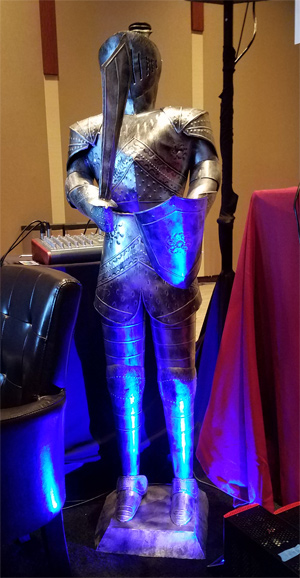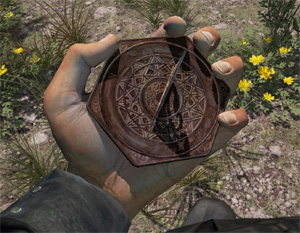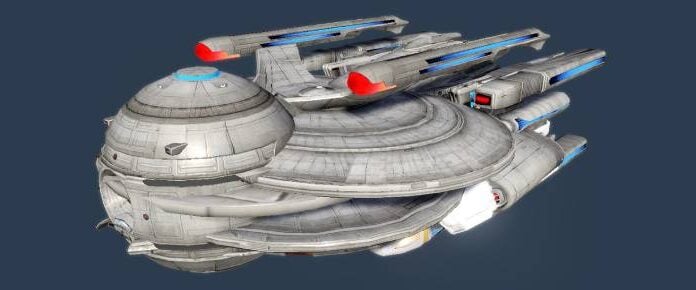
What is Chronicles of Elyria? We first learned about the game and its goal to redefine the MMORPG genre back in 2015. Since then, CoE has been developing steadily, especially after the huge influx of capital gained through Kickstarter and then on-site crowdfunding. Folks could follow the progress through numerous dev blogs, videos, and even the chance to test bits of gameplay at various PAXs. Some bits of that development, however, have raised questions; prospective players have voiced concerns about the pay-to-win and gankbox stigmas, the complex tribe system, and the admittedly broad scope of the game.
I sat down with Executive Producer Vye Alexander and CEO/Creative Director Jeromy Walsh at PAX West to discuss these issues and more.
 Subs, P2W, and B2P
Subs, P2W, and B2P
One of the two stigmas that players worry about with Chronicles of Elyria is “pay-to-win.” Alexander and Walsh both addressed these issues. Alexander explained that CoE will be using a different type monetization: As an indie studio, she noted, they can focus on doing right by the community that has backed them as well as the vision of the game instead if being beholden to a big publisher.
“We don’t have to worry about a publisher trying to turn us into a microtransaction game,” she said. “We can have our unique business plan that we have instead of a subscription fee, instead of microtransaction free-to-play model.” In particular, she doesn’t like subscriptions because “when players no longer get equity, value out of the game, they shouldn’t have to pay for it anymore.” Forgoing the sub model gets rid of that model’s propensity to add in “grindy, time-wasting kind of stuff to try and keep that perpetuity of experience, but you aren’t really necessarily doing anything interesting.”
“In Chronicles of Elyria we want people to be in the world because the world is better when people are there,” she told me. “Massively multiplayer game — that’s important. A lot of MMOs have turned into an online task list simulator with chat rooms.” Chat channels, she argues, are something that everybody turns off because people don’t actually want to be around annoying or even toxic players. Instead, people hang out just with a few friends.
As for microtransactions, besides emphasizing that everything needs to be craftable in game, Walsh explained,
“As a studio, if our business model is in selling cosmetics items, that’s how we as a studio have to spend our time, and I don’t want our team after launch spending all of our time creating sunglasses and hats and things like that. I want us to be spending our time creating new content, and new stories, and new technology — and things that are accessible to everybody. The microtransaction model doesn’t work for us.”
So what model works for CoE? Walsh told me buy-to-play is the studio’s favorite and that you can’t easily be pay-to-win in a B2P. But this model has one problem: Money comes with the release of expansions. And expansions mean holding back content until there is enough to make it worth paying for. “Expansions are actually almost diametrically opposed to what we are trying to do,” he stated. “We are trying to create a living, breathing world where every day the world is different and there is new content and new story and things like that.” Instead, the idea is that people will buy new life spans for their characters as we’ve previously covered.
That said, Walsh said there will be fundraising until game launches to build the world up. “This world would be so much richer and so much better if, on launch day when you come into the game, the settlements and the domains that exist are already run by players,” he said. “The king is an actual player, and the dukes and counts are players, and they are vying for you to come and join their settlements. They want you to be their citizens.”
What about the fact that those people buying the titles are gaining advantage by paying more? Walsh reminded that titles are not permanent and everything can change: “The title can be taken away, they can be assassinated, revolution can happen. We let every king know when they back that you are going to lose your title at some point. Someday somebody is going to overthrow you.” He also emphasized that players can also earn titles without spending any money; they can earn these through the influence system, which rewards players for helping others on forums, recruiting friends, and engaging with the community.
 Redefining PvP
Redefining PvP
The second stigma that worries many prospective players is that CoE could devolve into a gankbox. How is Soulbound Studios addressing this? Walsh said some of that concern comes from the misconception about CoE being a PvP-heavy game – it’s not, but it is, he argues.
“We like to say we have both the most and the least PvP of any game ever,” he explained. His position is that if you define PvP as hitting someone with weapon, Chronicles of Elyria isn’t much of a PvP game. You can walk up and hit anyone, but according to him, “it’s not going to happen as often as people think it will because we, as designers, are adding a lot of consequences to that type of behavior in the world because we don’t want that to be common place.” When it comes to physical violence, he said, the studio “will continue to iterate on the punishments and penalties until [Soulbound has] it tuned to the point that it’s something that exists, is happening, but it’s not so prevalent that people feel unsafe going outside in the world. ”
Instead, CoE defines PvP differently. “We definite PvP as a player’s ability to impact other players. And that can happen in so many different ways in Chronicles of Elyria,” he told me. Between contract systems, player-run governments and settlements, resource management, the gossip and reputation system, and the economy, you can affect other players in so many ways – even “religiously, socially, economically, and politically.”
Walsh said other similar games fail because they don’t give players recourse to combat griefing, but in CoE, folks can share info and blacklist troublemakers. And since there are survival elements in the game, if there is no where to call home, those griefers could have a very difficult time with surviving on their own.
 The evolution of tribes
The evolution of tribes
Some concern has been expressed about both the blandness of tribes (especially compared to the art of the creatures) and the similarities between CoE tribes and various real-life ethnic groups. Both of these can be explained by the evolution of the tribes.
Alexander addressed the first. “We’re still working on finding a lot of the characteristics of each of the tribes — what exactly their architecture looks like, what exactly their clothing styles are going to look like, what sort of weapons they would use. It started with trying to figure out what biomes they would have lived in and how they would have adapted to that.” Now the team will go back and start incorporating cultural elements like clothing, hairstyles, face painting, masks, and so on.
“We wanted to make sure everything had a natural, evolutionary reason for existing in the world,” she explained. Instead of just making something up on the spot, the team has taken the idea of moving a common ancestor around the world and having groups evolve depending on the area they moved to. What had to happen to adapt to live in that particular environment? Walsh said that the only good and fair way to create bloodlines and tribes was to start from scratch.
“In some cases our tribes do resemble cultural or ethnic groups on our planet, but that’s because the people in those regions evolved very similar to the way that they did in Elyria. And it wasn’t that we were trying. In fact we were explicit not to do so; in some cases we evolved in such a way that we were almost on the verge of stereotypes, and in those cases we actually went back and flipped it around.”
That entailed eschewing the stereotype of larger, stronger races being dimwitted and instead made them some of the most intelligent. “We didn’t want people to fall into those stereotypes,” Walsh said. “We wanted people to be aware of the fact that we were cognizant that those stereotypes might exist and we didn’t want to go that direction. So any relationships between the tribes in Elyria and ethnic groups on earth are solely coincidental based on the fact that we evolved on earth much the same way that they did on Elyria.”
 Can all the little bits turn into an MMO?
Can all the little bits turn into an MMO?
Chronicles of Elyria has been pushed back from a December release this year, and instead there will be smaller feeder titles like a MUD developed first. There is also the concern that between these projects and the fact that all playable demos have been focused on such a small scope that the devs might struggle expanding to a massive size of the full MMORPG.
As for the pushed back date, Alexander said that one reason is that it took took longer to hire folks in some areas than hoped, particularly in engineering. And in regard to the MUD and the small demonstrations at the conventions, she told me that it was a purposeful move to provide “a very detailed experience highlighting just a couple features.” The key is getting the feature to work well on a micro scale before moving it to the macro scale. As she put it,
“Each of the things we’ve been showing off so far has been extremely foundational for how we’ve been developing the game. We are trying to work on things in the right order. We’re trying to work smart because we are a small team and we need to be cognizant of how we are utilizing our resources. We can’t just rehash things and rebuild and refactor things all the time. We need to make sure we’re getting it right. So we’ve taken our time to make sure we’re giving it the care that it deserves”
In other words, she said, “We want to get these experiences out early so we can learn about them. There are still things we can learn and improve by getting feedback from our players.” Though the experiences have been more or less cordoned off and not open-world experiences, they are demonstrating how the devs want the game to look and feel. It’s also demonstrating what has been have developed so far. Additionally, doing it piecemeal instead of all at once isolates what the team needs to learn, from combat to parkour movement and now mounted combat. The MUD and other projects will only help that process, and note that they won’t bee monetized, just available as development tools open to the backers.
Walsh concurred. “Our pre-alpha experiences are really about allowing us to develop the game in a way that we can get feedback from the players as early as possible.” These small-scale experiences have apparently been valuable to the team in providing both feedback from players and gathering input on the mechanisms. “Even PAX for us is all about usability testing and feedback,” he told me. “We’ve learned a lot of lessons at this PAX West about camera angle and perspective.”
 Elyria’s end goal
Elyria’s end goal
Will the game meet its goal of changing the genre? Walsh made the point that the term MMORPG doesn’t even necessarily fit the game to begin with. He said of CoE, “It is not a massively multiplayer online game; it’s a massively multiplayer world. It is very, very much a living, breathing thing,” with its goal of allowing people to be connected in an organic way. CoE will be more of a civilization, with player economy and player government.
“People can find their role in the world and they can be a part of that to the extent that would like to be,” Alexander explained. This includes being just a farmer, armorer, tax collector, adventurer, or what have you. “We really want people to feel like they have a place in the world, a reason to log on. The world is always changing because of decisions players are making.” She emphasized that folks will play because the world is living, not because of the need to grind:
“That perpetuity of experience comes not just from the fact that there’s a bunch of activities to do — we don’t want grind. Instead it’s form the fact that the world is vibrant, and alive, and you are a part of it. Your character matters.”
How much will you matter? Decisions by rulers can have massive effects, but even a farmer who logs off to go on vacation for a couple weeks will affect the food supply for the area. In perspective, that may not be something that entices everyone!
Finally, the Soulbound Studios duo told me that that development is going very well. “We are at a place where a lot of our foundational elements are in,” Alexander told me. Those elements include both the engine and art style. Post-Kickstarter funding has also reportedly done very well, more than doubling the initial amount raised. With that, the velocity of development is even able to speed up.














